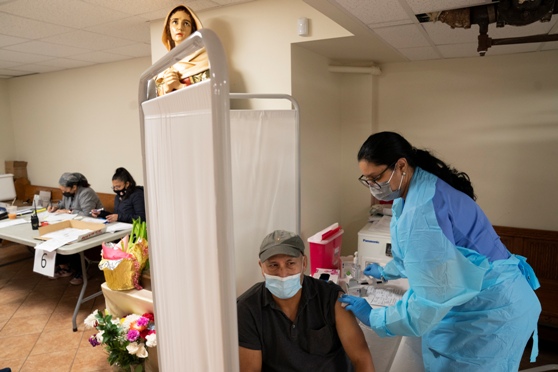As virus rages abroad, Biden promises to ship millions of vaccine doses

By Sheryl Gay Stolberg
WASHINGTON — President Joe Biden, under intense pressure to do more to address the surging pandemic abroad, including a humanitarian crisis in India, intends to make up to 60 million doses of the AstraZeneca vaccine available to other countries, so long as federal regulators deem the doses safe, officials said Monday (26).
The announcement came after Biden spoke with Prime Minister Narendra Modi of India and the two pledged to “work closely together in the fight against COVID-19.” It is a significant, albeit limited, shift for the White House, which has until now been reluctant to make excess doses of coronavirus vaccine available in large amounts.
Global health groups said the commitment was not nearly big enough. And it comes with a catch: The AstraZeneca doses were made at a Baltimore plant, owned by Emergent BioSolutions, where production has been halted amid fears of contamination. As part of a continuing safety review of the plant, the Food and Drug Administration will have to certify that the doses meet the United States’ standards for safety and quality.
Biden took office vowing to restore the United States as a leader in global public health, and he has taken certain steps to do so: rejoining the World Health Organization (WHO), pledging $4 billion to an international vaccine effort and providing financial support to help Biological E, a vaccine manufacturer in India, produce at least one billion doses of coronavirus vaccines by the end of 2022.
But on the matter of sending vaccines abroad that were manufactured for the United States and funded by American taxpayers, the president has been consistent: He will help other countries, he has said, but only after every American has had a chance to get a coronavirus shot. (He made a limited exception for Mexico and Canada last month.)
Now, with some states on the verge of reporting that their vaccine supplies exceed demand, the American vaccination campaign is at an inflection point, and the president appears more willing to consider sending surplus doses overseas. That may be especially true of the vaccine made by AstraZeneca, which is not authorized for use in the United States.
More than a year into the pandemic, as infections are beginning to ebb domestically, the coronavirus continues to sweep across the globe. The devastation is not limited to India. Brazil, which has had one of the world’s highest death tolls from COVID-19, now faces a hunger epidemic. In Turkey, which ranks fourth in the world in new daily cases per person, President Recep Tayyip Erdogan has ordered a three-week national lockdown, closing nonessential businesses and sending all students home.
Given the scope of the crisis, liberals on Capitol Hill and global health advocacy organizations say the president has a moral obligation to do more. Modi pressed the president in their call Monday to ease patent and intellectual property controls on pharmaceuticals, a cause liberals have also championed as they accuse Biden of kowtowing to pharmaceutical companies and their profits.
“Sixty million doses — that’s showing up to a four-alarm fire with an eyedropper full of water,” said Asia Russell, the executive director of Health GAP, a global AIDS treatment advocacy organization. Citing an interview Biden gave to health activist Ady Barkan, she said he had promised in his campaign “that intellectual property rights would not stand in the way of access to a successful COVID-19 vaccine.”
Senior Biden administration officials, asked by a reporter Monday whether they had a “moral obligation” to ease the patent restrictions, said they had no new information to share. But Jen Psaki, the White House press secretary, defended the president’s response.
“The United States has been one of the largest providers of assistance to address the COVID pandemic around the world, including to India, and we have obviously taken some significant steps over the last couple of days to address their immediate needs,” Psaki said.
With worrisome variants spreading in the United States and around the world, public health experts say vaccinating people overseas is not only a moral imperative, but it is essential to protecting Americans. J. Stephen Morrison, the director of the Global Health Policy Centre at the Centre for Strategic and International Studies, said Biden needed to offer a more sweeping vision of how the United States can help the world.
“We are approaching these colossal, complex problems in an ad hoc, reactive, short-term manner,” Morrison said. He called the announcement on Monday a “further incremental step by the Biden administration toward fuller engagement internationally to address the dire vaccine gap.”
On a conference call with reporters Monday, senior Biden administration officials said that in addition to the money pledged to the international vaccine initiative, known as COVAX, the administration intended to spend $11.5 billion, appropriated by Congress as part of the $1.9 trillion stimulus package, on helping other countries fight the pandemic and administer vaccines.
But the officials would not address questions about patent waivers on vaccines developed by Pfizer-BioNTech and Moderna using sophisticated biotech methods. The Moderna vaccine was developed in partnership with the federal government.
The announcement Monday about the AstraZeneca vaccine came only a day after the administration unveiled a series of steps to help India, including easing the way for the export of raw materials to make vaccine, and supplying that country with therapeutics, rapid diagnostic test kits, ventilators and personal protective gear.
-New York Times

